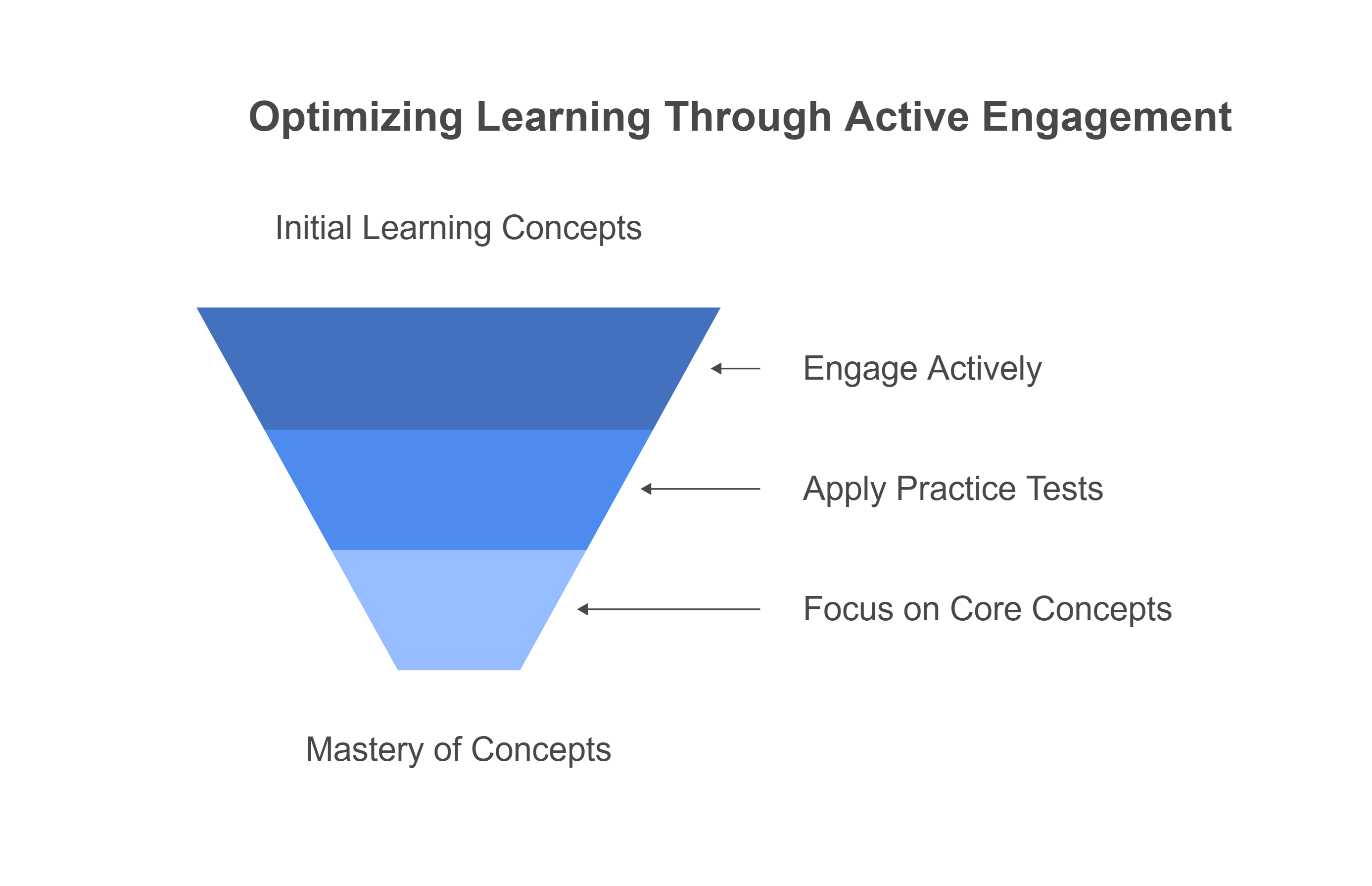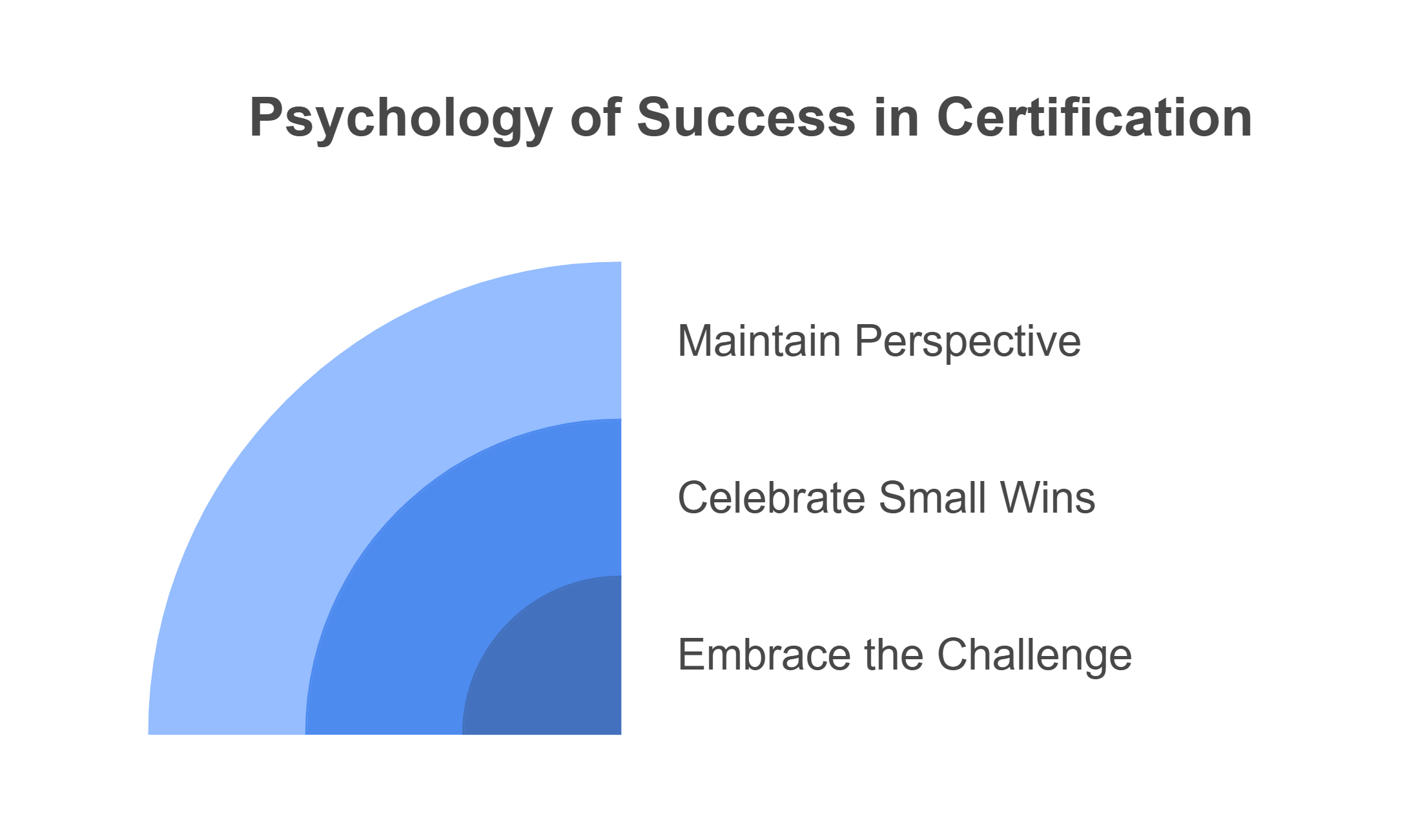"Ever wondered why some candidates ace IT certification exams like Microsoft Azure or CompTIA certification on the first try while others struggle repeatedly? Let's uncover the effective exam prep strategies that really work."Are IT certification exams intimidating or exciting? The difference lies in your study approach. If you've ever asked yourself why some people seem to pass major exams—like Microsoft Azure or CompTIA certification exams —with confidence while others struggle, you're in the right place. This comprehensive guide will equip you with actionable, research-backed strategies on how to study for IT certifications , so you can boost your score and unlock new career opportunities.Unlocking Your Potential: Why Knowing How to Study for IT Certifications MattersUnderstanding how to study for IT certifications can be the crucial factor in landing your next IT job or getting that coveted promotion. With the rapid pace of technological change, demonstrating expertise through certifications is becoming increasingly vital. Whether you’re targeting network, cloud, or security certifications, the right exam prep can open specialized roles, enhance your competitiveness, and potentially increase your salary. Most importantly, a strategic approach to exam preparation helps you retain more knowledge, stay focused, and approach exam day with confidence.For example, a professional who meticulously plans their study time , leverages the correct study materials, and routinely takes practice exams is more likely to achieve a passing score. This method is seen across successful candidates, from those earning their first CompTIA certification to advanced professionals tackling Azure AD or Microsoft Azure exams. By following structured processes, you can target weak spots, avoid last-minute cramming, and step into the certification exam room empowered and well-prepared.The Value of Passing Certification Exams for Career AdvancementSecuring a certification exam not only verifies your technical expertise but also distinguishes you in the increasingly competitive IT job market. Achieving certifications such as Microsoft Azure , CompTIA , or Cisco signals to employers that you have up-to-date, practical knowledge in specific technology domains. Furthermore, certifications often correlate with higher earning potential and access to more advanced, specialized roles. Many job postings, particularly for cloud or network security, explicitly require certain certifications as baseline credentials for consideration.Job market competitivenessPotential for salary increasesDemonstrated expertise in technologies like Microsoft Azure and CompTIAAccess to specialized roles requiring certification exam credentialsWhat You'll Learn About How to Study for IT CertificationsThis guide is designed to transform the way you approach IT exam prep. You’ll discover the most practical and effective study materials for certifications like Microsoft Azure and CompTIA , proven strategies for building a personalized exam preparation plan , and expert-backed methods for maximizing your practice exam performance. By internalizing these techniques, you’ll be prepared to tackle even the most challenging certification exams.Practical exam prep techniques for IT certificationsHow to use the best study materials and practice examsWays to tailor your study plan for specific certification exams such as Microsoft Azure and CompTIAExpert tips to maximize your certification exam performanceHow to leverage practice exams for accurate exam preparationHow to Study for IT Certifications: Building a Strategic Exam Prep PlanBefore opening your first textbook or online module, it’s critical to develop a strategic exam prep plan that aligns with your learning style, schedule, and certification goals, especially for challenging certification exams like Azure AD or Microsoft Azure. Effective planning starts with clear, measurable objectives focused on the exam’s exam objectives. Break down content into manageable sections, estimate the amount of time needed per topic, and establish a routine that accommodates work or personal commitments.Consider mapping the requirements and timelines for multiple certifications – such as CompTIA A+ or Azure AD – to compare their structures and prerequisites. This overview lets you plan the order in which you’ll tackle exams, decide when to integrate practice tests, and set benchmarks for progress. A well-structured plan transforms your exam preparation into a series of achievable milestones, increasing your chances of success and reducing stress.Setting Smart Goals for Your Certification ExamsEvery successful exam prep journey starts with Specific, Measurable, Achievable, Relevant, and Time-bound (SMART) goals. Instead of vaguely aiming to “study harder,” set actionable targets—such as completing a certain number of chapters or hours of hands-on labs per week. Tracking progress ensures you aren’t leaving critical topics until the last minute, and it helps identify areas where you may need additional resources or support.For instance, if your end goal is to pass the Microsoft Azure Fundamentals exam, break your plan into tasks like finishing one practice test weekly or mastering two key topics every five days. By mapping out personal deadlines and leveraging digital productivity tools, you maintain steady momentum. Celebrate small victories to sustain motivation and adjust your plan as needed based on your practice exam outcomes.Choosing the Right IT Certification: From Microsoft Azure to CompTIAIt’s essential to choose an IT certification aligned with your career path, current skills, and industry demand. Start by researching each certification’s exam objectives and prerequisites. For network beginners, CompTIA A+ or Network+ offers foundational learning, while cloud enthusiasts might find Microsoft Azure Fundamentals or Azure AD more valuable.Carefully examine the content presented in official syllabi and ask yourself if the certification addresses your interests and personal career goals. Browsing IT forums, employer job postings, and connecting with mentors helps clarify which certificate best matches your trajectory. By understanding which exam prep and study materials support your chosen certification, you increase your efficiency, stay focused, and build a stronger resume for future job applications.Selecting the Best Study Materials for IT Certification Exam PreparationNot all study materials are created equal—choosing the right ones heavily influences your exam preparation. Start with official certification guides, then complement them with online courses, interactive labs, and up-to-date community resources. High-quality study material ensures you’re covering the latest exam objectives , familiarizing yourself with the test format, and applying theoretical knowledge in practical scenarios.Evaluating Study Material Options: Books, Online Courses, and Official GuidesWhen evaluating study materials for your certification exam, focus on guides and resources that are officially endorsed by certification vendors like Microsoft or CompTIA. These often reflect the current exam objectives precisely. Supplement these guides with up-to-date online courses from respected platforms, like CBT Nuggets, and consider interactive labs that simulate real-world scenarios. The integration of community forums or resources such as Cert Empire can also give you access to first-hand tips and peer feedback.Official certification guidesUp-to-date online coursesInteractive labsCommunity-supported resourcesTop Study Materials for Popular Certification Exams: Microsoft Azure, CompTIA, and MoreThe best study materials vary by certification. For Microsoft Azure , the official Microsoft Learning Platform offers reliable guides supplemented by modules and hands-on labs. CompTIA certification candidates benefit from the CompTIA CertMaster suite, books, and active participation in practice labs. For other certifications—such as Cisco or AWS—seek out vendor-provided learning portals, network simulators, and high-quality third-party books. Join communities where certified professionals review tools and share feedback to ensure your study material is up to date and practical."Choosing the right study materials can mean the difference between passing and retaking a certification exam."Mastering Exam Prep Techniques for Certification Exams SuccessOnce you have your study materials , the next step is mastering your exam prep methodology. Adopting active learning strategies improves retention and comprehension. This could mean creating detailed notes, sketching mind maps, and using spaced repetition—reviewing topics at increasing intervals to embed knowledge. These proven techniques help you recall the correct answer under exam pressure and solidify foundational concepts.Active Learning Strategies: Notes, Mind Maps, and Spaced RepetitionPassive reading isn’t enough for complex IT concepts. Engage through active learning techniques : take handwritten or digital notes, break down topics into mind maps, and recap new material regularly. Tools like Anki for spaced repetition or visual software for mind mapping can make a significant difference in memory retention. These approaches cater to various learning styles and enhance the value of your study material.Combine theory with hands-on labs to reinforce your understanding. For instance, when studying networking, practice configuring an IP address on virtual environments. This cements book knowledge and helps connect abstract concepts to practical application, which is often tested in both Microsoft Azure and CompTIA certification exams.Scheduling and Managing Your Study Time for IT Certification Exam PreparationConsistency is key in exam preparation. Develop a realistic study schedule that fits around your professional and personal commitments. Set aside dedicated study time each day or week, ensuring you have regular reviews of previously covered topics. Using digital tools like calendars, task management apps, or exam prep planners will help monitor progress and avoid last-minute cramming.Remember to adapt your plan based on the amount of time available before the exam. Regularly assess your mastery of the content by integrating short quizzes or practice exams at the end of each study session. Periodically, revisit topics where you scored lowest to strengthen weak areas, maintaining flexibility in your schedule for unexpected disruptions.The Power of Practice Exams: Your Secret Weapon in IT Exam PrepPractice exams are an indispensable resource for any IT professional aiming to conquer certification exams such as Microsoft Azure, Azure AD, or CompTIA certification. They not only simulate the real test environment but also help you benchmark your readiness. Routinely taking timed practice exams provides firsthand exposure to the actual test format, types of questions, and complexity—reducing anxiety and building test-taking stamina.How to Effectively Use Practice Exams for Exam PreparationThe key to leveraging practice exams is to treat them as learning tools rather than simple assessments. Take a practice exam under exam-like conditions, carefully review your responses, and spend time understanding the correct answer for each missed question. Focus on repeating the test until you consistently achieve or exceed the required passing score, thereby boosting confidence for the real exam.Familiarize with real exam formatIdentify weak knowledge areasReduce anxiety by simulating test conditionsInterpreting Practice Exam Scores: Understanding the Correct Answer and Improving PerformanceAchieving a high passing score on practice exams is a promising sign, but the real value is in analyzing incorrect responses to understand the correct answer and improve your exam preparation. Scrutinize every incorrect answer to understand the gap in your knowledge or misunderstanding. This process helps identify trends in weak areas—be it a section on configuring an IP address or tackling Azure AD functionalities—and pinpoints topics requiring deeper review.Use answer rationales provided by reputable sources like Cert Empire or exam prep vendors. Understanding the logic behind the correct answer cements your grasp on core concepts. Repeat the cycle with new sets of practice tests and use detailed explanations to progressively eliminate knowledge gaps, thereby increasing the likelihood of certification success.Exam Preparation Tips for Microsoft Azure and Azure AD Certification ExamsPassing Microsoft Azure and Azure AD certification exams requires a nuanced exam prep approach that combines study materials, practice exams, and hands-on labs. Focus not only on bookwork, but also on hands-on labs and real-world scenarios. Azure certification exams typically test your ability to apply concepts in practical cloud environments. Integrate active simulation labs, sandbox environments, and study groups to enhance your practical understanding.Dedicated Study Approaches for Microsoft Azure and Azure ADStructure your study sessions around the official Microsoft Learn portal, which offers modules, interactive labs, and detailed skill assessments. Use scenario-based practice questions, as Microsoft Azure and Azure AD exams frequently employ case studies. Study how to manage precise location and permissions settings, which are common topics in Azure AD. Regularly revisit online forums—such as TechNet or Reddit—for up-to-date exam tips and insights from fellow candidates.Common Pitfalls in Azure Certification Exam Prep and How to Avoid ThemAmong the most common pitfalls are neglecting hands-on labs, ignoring scenario-based questions, and underestimating the integration between different Azure services. Avoid surface-level reading—delve deep into the activity on this service, and understand how it can be combined with other information for real-world solutions. arefully review all forms you submit in online labs, paying attention to error messages and feedback as these experiences often reflect real exam challenges. Rely on current, official study materials and avoid outdated guides to maximize success.Targeted Exam Prep for CompTIA Certification ExamsCompTIA certifications —like A+, Network+, and Security+—require a blend of theoretical study and practical application. Unlike some vendor certifications that might focus more on configuration or software, CompTIA puts significant emphasis on foundational technical skills, troubleshooting, and security basics.Tailoring Your Study Materials for CompTIA CertificationStart with the official CompTIA study guides and CertMaster e-learning resources to cover exam objectives comprehensively. Next, seek out third-party practice labs and community study groups. Engage with Cert Empire’s extensive database of practice questions and peer-sourced insights. These will help you master essential knowledge, from basic hardware troubleshooting—like identifying IP address issues—to network security protocols.Exam Prep Insights for Passing CompTIA Certification ExamsA major differentiator for CompTIA certification candidates is consistent, hands-on practice combined with regular use of practice exams and quality study materials. Prioritize labs and simulations alongside theory. Routinely complete practice tests and analyze the explanations for each correct answer. Join forums or Discord communities for discussion and troubleshooting—all of which support the purposes explained in this notice and build deeper understanding."Success in CompTIA certification exams often depends on hands-on practice, not just theoretical knowledge."Staying Motivated and Tracking Your Progress During IT Certification StudyMotivation often wanes during long study periods. It’s important to track your progress and stay accountable. Leverage study groups, online communities, and mentorship for regular check-ins, support, and feedback. Peer learning offers personal aspects and insights often overlooked in solo study, such as tips on exam objectives or adjustments to your study plan.Utilizing Study Groups, Online Communities, and MentorshipJoin formal or informal study groups —on platforms like Reddit, Discord, or TechNet—for instant support and encouragement. Mentorship, whether from an experienced coworker or an online coach, can help you refine your exam prep plan, identify blind spots, and access exclusive study resources. The shared experience and accountability drive consistency, which often translates to exam success.Celebrating Milestones and Adjusting Your Exam Preparation PlanRecognizing achievements along your journey—completing a tough module or achieving a high score on a practice test—boosts morale and keeps you motivated. Track these milestones with a physical chart or digital planner. If progress slows or your practice exam results plateau, don’t hesitate to adjust your study plan. Embrace flexibility and refine your approach to ensure continual improvement and maximize your chances for certification exam success.Comprehensive Table: Comparison of Top Study Materials for Popular IT Certification ExamsExamStudy MaterialFormatStrengthsWeaknessesMicrosoft AzureMicrosoft Learn, Official Study Guides, PluralsightOnline Modules, Books, LabsInteractive labs; up-to-date content; community supportVolume of material; can overwhelm beginnersCompTIACompTIA CertMaster, Exam Cram, Cert EmpireOnline Platform, Books, Practice TestsVendor-authored; comprehensive coverage; hands-on labsCan be dry; requires supplemental practice labsCiscoCisco Networking Academy, O’Reilly, Boson Practice ExamsOnline Courses, Books, Practice ExamsRealistic simulations; scenario-based learningChallenging for beginners; subscription required for full accessAWSAWS Training, ACloudGuru, WhizlabsOnline Labs, Video Lectures, QuizzesLab-centric; modular content; active communityConstant updates; can lack exam-specific focusTop Exam Prep Mistakes to Avoid When Studying for IT Certification ExamsEven the most hardworking candidates can fall into traps that derail their exam preparation. Ignoring exam objectives , skipping practice exams , or underestimating the value of hands-on labs dramatically reduces the likelihood of a passing score. Avoid cramming at the last minute, as it often leads to poor retention and increased stress. Instead, take a balanced, steady approach to study time.Ignoring the exam objectivesSkipping practice examsUnderestimating hands-on labsCramming last minuteExpert Insights: Quotes from Successful IT Professionals"Practice, persistence, and peer support are vital components of any IT certification success story." – Senior IT EngineerWatch this animated walkthrough for actionable exam prep phases, from researching study materials to taking practice exams and using IT forums for peer advice.People Also Ask: How to Prepare for IT Certifications?How to Prepare for IT Certifications?Strategic planning is key to preparing for IT certifications. Begin by researching the exam objectives, gathering the best study materials, and building a consistent study schedule. Supplement learning with quality practice exams to measure your readiness.What is the Best IT Certification for a Beginner?Many consider CompTIA A+ or Microsoft Azure Fundamentals to be ideal starting points. These certifications cover essential hardware, networking, and cloud basics, setting a strong foundation for an IT career.How to Study for a Certification Exam?Break down the exam into modules or domains, use a mix of videos, books, and practice exams, and follow a schedule. Join forums or study groups to reinforce learning.Can I Get an IT Job with Just Certifications?Yes, many entry-level IT roles require only certifications. However, hands-on experience through labs or internships greatly enhances your prospects.FAQs About How to Study for IT CertificationsHow long should I study for an IT certification?Where can I find reliable practice exams?What’s the best way to memorize complex information?Hear firsthand tips and proven exam prep strategies from a certified IT professional, including how to stay motivated and adapt to new certification requirements.Summary and Next Steps for IT Certification Exam SuccessBegin with a clear planUtilize proven study materialsIntegrate practice exams oftenLearn from mistakes and adjust approachStay connected with the IT communityReady to Boost Your IT Career? Start Applying These Study Strategies for Certification Exam Success Now!Take the first step by building your exam prep plan, gathering top-notch study materials for Microsoft Azure, Azure AD, and CompTIA certification, joining supportive communities, and practicing consistently with practice exams. Your IT certification—and career success—awaits!



 Add Row
Add Row  Add
Add 



